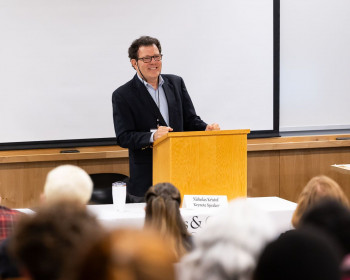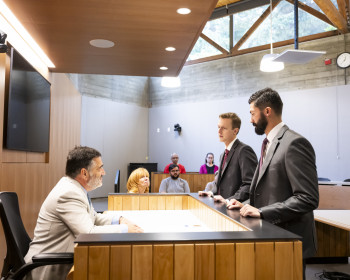Earthrise Scores a Win to Save Endangered Condors
Open gallery

In a hard-fought Ninth Circuit case, Earthrise Law Center at Lewis & Clark Law School recently prevailed in a suit against the US Forest Service under the Resource Conservation and Recovery Act (RCRA) for failing to stop the disposal of lead ammunition in Arizona’s Kaibab National Forest. The lead from the ammunition used by hunters poisons the remains of animals that have been shot, thereby killing or injuring critically endangered condors that scavenge in the area.
According to Allison LaPlante, co-director of Earthrise and lead attorney on this case, a 2018 report shows that 77% of condors tested exhibited evidence of lead exposure greater than 15 micrograms per deciliter, with about a third of the birds showing levels greater than 65%.
“They begin experiencing harm from lead poisoning anywhere greater than 10 micrograms per deciliter,” LaPlante said. “So it doesn’t take very much.”
Representing the Center for Biological Diversity, the Sierra Club and the Grand Canyon Wildlands Council, Earthrise went up against not only the Forest Service, but the National Rifle Association, the National Shooting Sports Foundation, and the Safari Club International—all of which intervened in an effort to block the litigation.
The district court initially threw the case out, claiming that the plaintiffs lacked standing. In 2016, the Ninth Circuit reversed that ruling, handing it back down to the district court. After that, the district court dismissed the case again, this time insisting that the court lacked jurisdiction because the claims sought an improper ‘advisory opinion.’ But again the Ninth Circuit disagreed. The Ninth Circuit panel found that “the district court’s holding, albeit purportedly grounded in separation of powers principles, is irreconcilable with the system those principles exist to serve.”
The appeals court remanded the case to the Arizona district court for further proceedings.
Nate Hausman JD ’11 and Meredith Price JD ’13 were two of the many students who significantly contributed to the development of this case during their time at Earthrise.
Price researched and helped draft the brief for the first appeal to the Ninth Circuit, pertaining to the constitutional standing elements of Earthrise’s RCRA claim.
“The staff attorneys working at Earthrise have demonstrated resilience, resourcefulness, and dedication. It is easy to forget how long it can take to navigate through the federal court system,” Price said.
Hausman’s research in 2011, before the first District Court case was filed, laid the groundwork for litigation. He investigated the condor population decline, lead exposure as a causal link, the history of the nationwide ban on the use of lead ammunition for waterfowl, and potential environmental laws to hinge the case on.
“The RCRA claim that we decided to pursue was novel and exciting. It demonstrated to me that creative applications of the law could be used to address real-world problems,” Hausman said. “The more I dug into the research the more it became clear that 1) the lead ammunition problem was serious, 2) that it was substantially responsible for condors’ inability to make a more complete recovery, and 3) that the problem was remediable.”
Hausman traveled to Ojai, California, with Earthrise attorneys to learn about condor recovery efforts from experts. “Seeing those giant birds soaring above, you couldn’t help but feel the gravitas of the issue. You saw the shadows the condors cast, you felt their presence, and you palpably sensed the importance of doing something to help,” Hausman said.
Earthrise is hopeful that the Arizona District Court will finally allow the plaintiffs to proceed with the merits of their claim. If it does, the Forest Service could be compelled to take action to prevent the disposal of spent lead ammunition on the Kaibab National Forest, which is an incredibly important habitat for these majestic birds.
Law Communications is located in room 304 of Legal Research Center (LRC) on the law Campus.
MSC: 51
email jasbury@lclark.edu
voice 503-768-6605
Cell: 626-676-7923
Assistant Dean,
Communications and External Relations, Law School
Judy Asbury
Law Communications
Lewis & Clark Law School
10101 S. Terwilliger Boulevard MSC 51
Portland OR 97219

